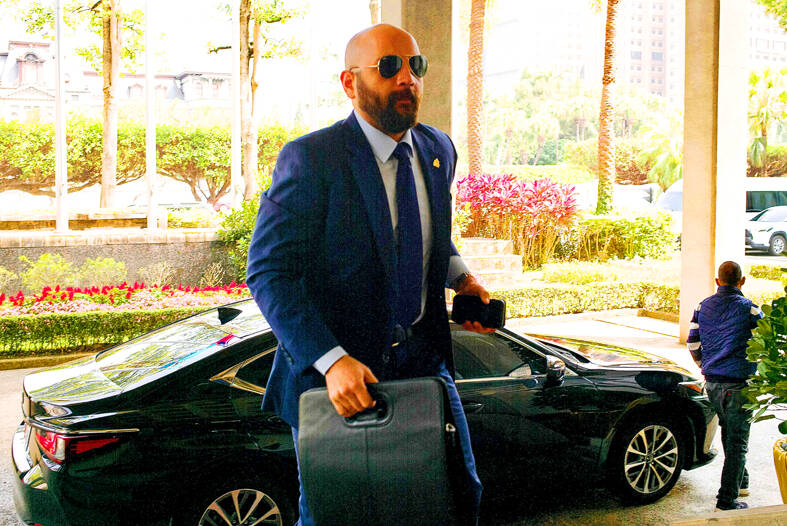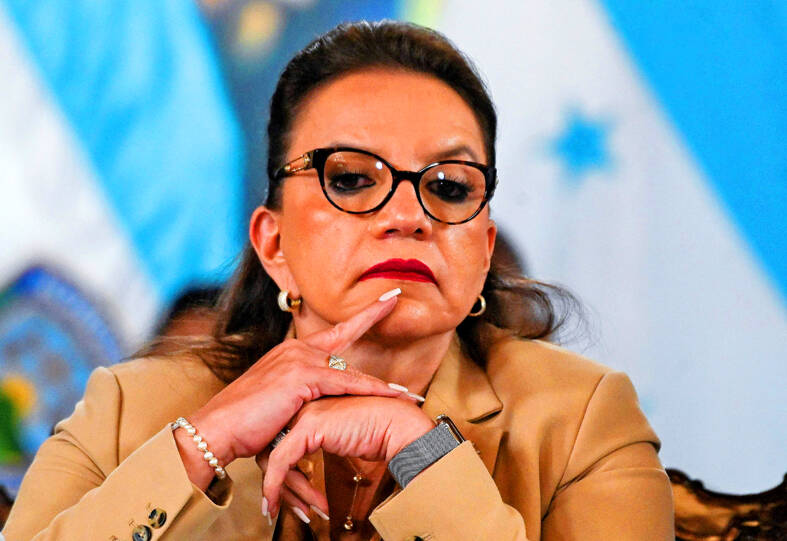The Ministry of Foreign Affairs yesterday said that it had expressed “grave concern” to the government of Honduras after Honduran President Xiomara Castro on Tuesday wrote on Twitter that it would pursue official diplomatic relations with China.
In addition to issuing a statement, Vice Minister of Foreign Affairs Alexander Yui (俞大㵢) summoned Honduran Ambassador to Taiwan Harold Burgos to the ministry in Taipei early yesterday to voice the government’s concerns.
The meeting lasted about 20 minutes and Burgos did not make any public comments upon arriving at the ministry.

Photo: Sam Yeh, AFP
Burgos said shortly after noon that he had not yet heard from his country’s foreign ministry.
“President Castro has given an instruction to [Honduran] Minister [of Foreign Affairs Eduardo Enrique] Reina. We are waiting for further direction from our ministry,” he said.
Burgos was referring to a post by Castro early yesterday morning Taiwan time expressing her desire to seek official ties with China — a position she had taken during her presidential run, but appeared to back off from after taking power in January last year.

Photo: AFP
“I have instructed Chancellor Eduardo Reina to manage the opening of official relations with the People’s Republic of China as a sign of my determination to comply with the government plan and expand the borders freely in concert with the nations of the world,” she wrote in Spanish.
The foreign minister position is colloquially called “chancellor” in some Spanish-speaking countries.
Castro did not specify whether her country would end diplomatic relations with Taiwan before securing ties with China.
China requires that Taiwan’s allies sever ties with Taipei before establishing relations with it.
Taiwan’s foreign ministry said in a statement that it was not considering ending diplomatic relations with Honduras before the Central American country announced a diplomatic switch.
However, Taipei has expressed grave concern to Tegucigalpa over the post, and would continue to engage in talks with the ally and stress that Taiwan is a genuine friend and partner that has offered assistance to Honduras for decades.
Beijing always offers “false promises” to Taipei’s allies, with the sole purpose of snatching them away to diminish Taiwan’s international presence, the statement said.
Unlike China, Taiwan has for many years pushed forward projects that improved the well-being of Hondurans, it said.
“Our government has asked our Honduran counterpart to carefully consider [the situation] and not fall into China’s trap and make a wrong decision that would jeopardize our decades-long bilateral friendship,” the statement said.
Honduras is an important ally of Taiwan, it said, adding that Taiwan’s government would continue working with like-minded countries to strengthen cooperation and deepen friendships with its allies.
If Honduras were to end official diplomatic relations with Taiwan, the nation would be left with relationships with 12 UN member nations, as well as the Vatican and Somaliland.
Honduras would also become the ninth diplomatic ally, and fifth in Latin America, Taipei has lost to Beijing since President Tsai Ing-wen (蔡英文) took office in May 2016.

CHAOS: Iranians took to the streets playing celebratory music after reports of Khamenei’s death on Saturday, while mourners also gathered in Tehran yesterday Iranian Supreme Leader Ayatollah Ali Khamenei was killed in a major attack on Iran launched by Israel and the US, throwing the future of the Islamic republic into doubt and raising the risk of regional instability. Iranian state television and the state-run IRNA news agency announced the 86-year-old’s death early yesterday. US President Donald Trump said it gave Iranians their “greatest chance” to “take back” their country. The announcements came after a joint US and Israeli aerial bombardment that targeted Iranian military and governmental sites. Trump said the “heavy and pinpoint bombing” would continue through the week or as long

TRUST: The KMT said it respected the US’ timing and considerations, and hoped it would continue to honor its commitments to helping Taiwan bolster its defenses and deterrence US President Donald Trump is delaying a multibillion-dollar arms sale to Taiwan to ensure his visit to Beijing is successful, a New York Times report said. The weapons sales package has stalled in the US Department of State, the report said, citing US officials it did not identify. The White House has told agencies not to push forward ahead of Trump’s meeting with Chinese President Xi Jinping (習近平), it said. The two last month held a phone call to discuss trade and geopolitical flashpoints ahead of the summit. Xi raised the Taiwan issue and urged the US to handle arms sales to

BIG SPENDERS: Foreign investors bought the most Taiwan equities since 2005, signaling confidence that an AI boom would continue to benefit chipmakers Taiwan Semiconductor Manufacturing Co’s (TSMC, 台積電) market capitalization swelled to US$2 trillion for the first time following a 4.25 percent rally in its American depositary receipts (ADR) overnight, putting the world’s biggest contract chipmaker sixth on the list of the world’s biggest companies by market capitalization, just behind Amazon.com Inc. The site CompaniesMarketcap.com ranked TSMC ahead of Saudi Aramco and Meta Platforms Inc. The Taiwanese company’s ADRs on Tuesday surged to US$385.75 on the New York Stock Exchange, as strong demand for artificial intelligence (AI) applications led to chip supply constraints and boost revenue growth to record-breaking levels. Each TSMC ADR represents

Pro-democracy media tycoon Jimmy Lai’s (黎智英) fraud conviction and prison sentence were yesterday overturned by a Hong Kong court, in a surprise legal decision that comes soon after Lai was jailed for 20 years on a separate national security charge. Judges Jeremy Poon (潘兆初), Anthea Pang (彭寶琴) and Derek Pang (彭偉昌) said in the judgement that they allowed the appeal from Lai, and another defendant in the case, to proceed, as a lower court judge had “erred.” “The Court of Appeal gave them leave to appeal against their conviction, allowed their appeals, quashed the convictions and set aside the sentences,” the judges